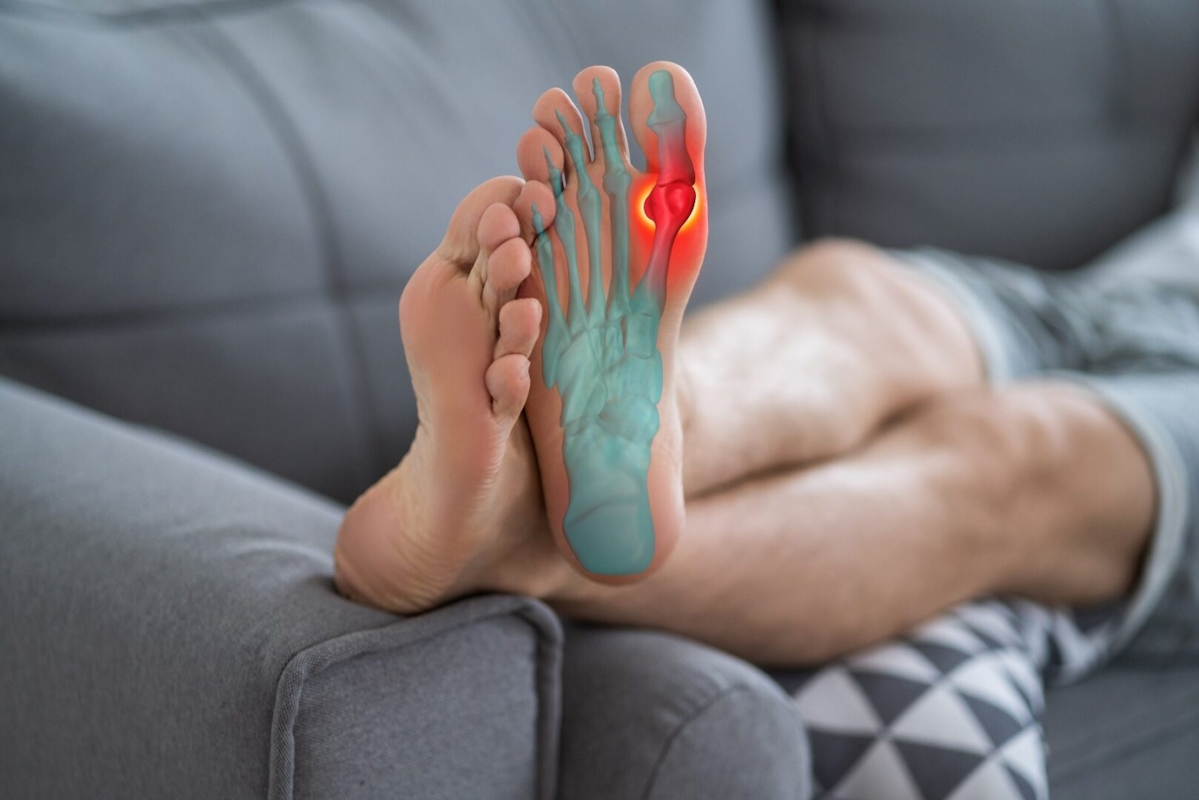How Does My Diet Impact My Foot Health?
Author: StrideCare Internal Team

If you’ve been scheduling routine visits with your podiatrist and have been following their recommended treatment plans to a T, your foot health is obviously important to you. As a result, you’re finally experiencing the results that have alluded you for all these years. Congratulations! But don’t stop here. While your podiatrist will always be the first person to turn to for help with conditions ranging from bunions and chronic plantar fasciitis to neuromas and other debilitating conditions, there are a variety of things you can be doing for yourself in addition to those services—starting with taking a long, hard look at how your current diet is impacting your foot health.
We all need to eat better, make informed choices, and start healthy habits that last a lifetime. And perhaps there’s no better reminder of this during National Nutrition Month in March. You may associate a good diet with weight loss and heart health, but what you’re eating makes a difference in how your body feels from head to toe. This includes your feet.
Are You Dealing With Any of These Foot Health Issues?
- Bunions
- Hammertoe
- Plantar fasciitis
- Foot fracture
- Nerve pain
- Neuropathy
- Warts
- Chronic wounds
- Neuromas
- Gout
- Ingrown toenail
Do you want better foot health in 2024? Request an appointment with a StrideCare podiatry specialist today. Our collaborative approach ensures you receive the care you need.
Better Diet Equals Improved Foot Health in 2024
You and your podiatrist can do so many things to take care of your feet. Inspecting them regularly, keeping them clean and dry, and wearing the right shoes are all great starting points. If you still run into problems that can’t be resolved with good old-fashioned rest, medication, and physical therapy, you can begin exploring a variety of non-surgical and surgical treatment options to meet your unique needs.
These are all effective strategies to get you back on your feet faster. However, most experts believe proper nutrition through a healthier diet is one of the easiest ways to support your foot health long term.
Here are just a few well-known benefits a better diet can have on your foot health:
- Reduced inflammation — Studies consistently show that diets high in sugar, saturated fats, red meats, starch, and processed foods can create excess inflammation in the body and lead to anything from arthritis to plantar fasciitis, gout, bunions, corns, and ingrown toenails. Conversely, a healthier diet that includes leafy greens, fish, berries, etc., fills your body with foods and nutrients that fight inflammation.
- Improved circulation — Your feet are almost always the first area of the body impacted by poor blood flow. As a result, they won’t get the oxygen and nutrients they need, and you’ll have a tougher time fighting off infections that can lead to chronic wounds that won’t heal. The good news is that reversing circulation problems is possible and starts with regular exercise and choosing better foods.
- Strong bones and connective tissues — There are 33 joints, 26 bones, and more than a hundred muscles, tendons, and ligaments in your feet. When we choose a diet high in calcium and Vitamin D, our bones have what they need to become stronger and healthier, thus greatly reducing the chance of foot and ankle injuries such as fractures. Even if you can’t avoid a fracture, you can heal faster and avoid further complications.
- Healthy nerves — One of the top benefits of a healthy diet on foot health is supporting normal nerve function. This includes limiting pain, numbness, tingling, and other neuropathy symptoms.
- Disease prevention — A diet high in simple carbohydrates can lead to a variety of chronic diseases, including diabetes. Examples of simple carbs to avoid include sodas, baked treats, fruit juice concentrate, cereal, and even packaged cookies. Many diseases can be avoided or controlled by eliminating these items from your diet.
- Weight loss — Did you know you transmit three to six times your body weight through your foot? So, it stands to reason that the heavier you are and the more foods you eat with high fat count (pizza, fries, etc.), the more pressure you place on your feet and ankles. Improve your foot health with a diet that promotes weight loss.
What Foods Can I Eat To Improve My Foot Health?
While it is important to avoid bad foods, it is also imperative that you replace those foods with those that help you maintain a healthy Body Mass Index, boost your energy so that you remain active, and promote all the benefits mentioned above. Which foods help improve foot health? Below are a few to consider:
- Fruits, vegetables, and leafy greens — Focus on foods that have a variety of colors. This includes tomatoes, pomegranate, broccoli, spinach, citrus fruits, red and yellow onions, celery, kale, strawberries, and tropical fruits. Fruits and vegetables have anti-inflammatory properties, and leafy greens are high in fiber.
- Fiber-rich foods and whole grains — Fiber-rich foods help manage blood pressure, cholesterol, and promote digestion. According to the Mayo Clinic, women should try to eat at least 21 to 25 grams of fiber a day, while men should aim for 30 to 38 grams a day. Fiber can be found in apples, carrots, nuts, seeds, oatmeal, and berries.
- Omega-3 fatty acids — There is such a thing as beneficial fats. They can be found in fish, walnuts, flaxseeds, and chia seeds, and they are great for reducing inflammation.
- Foods high in Vitamin C — Vitamin C improves circulation and foot health. You can find Vitamin C in anything that is citrus-related, as well as onions, spinach, tropical fruits, potatoes, peppers, and broccoli.
- Foods high in Vitamin E — Vitamin E has been shown to improve skin health and avoid conditions such as cracked skin. Vitamin E can be found in mangos, avocados, olive oil, pumpkin, nuts, seeds, fish, and dark leafy greens.
- Fish and fish oil — Salmon, mackerel, tuna, sardines, etc., are high in Omega-3, which stimulates blood flow, breaks down blood clots, and improves foot health.
- Dark chocolate — Dark chocolate, not milk chocolate, reduces inflammation, improves mood, and improves foot health by increasing blood flow. According to one study, researchers say the polyphenols in dark chocolate reduce oxidative stress and help the body form more nitric oxide, a compound that causes blood vessels to dilate.

Are you looking for relief from foot problems? You don’t have to be saddled with poor foot health forever. Call today and request an appointment with one of StrideCare’s expert podiatric physicians.
Trust StrideCare’s Experts With Your Foot Health
If your foot health has become a major issue in your life, there may come a day in the not-so-distant future when your podiatrist will recommend changing your diet. Our team of podiatry experts at StrideCare understands how much you care about your foot health, and we are elated that you have chosen our professionals to help with that journey. A consultation with one of our podiatrists can determine the type, severity, and location of your issues. Furthermore, our expert doctors and caring staff at our Texas-based podiatry clinics utilize the latest technologies and minimally invasive procedures to help our patients reclaim their lives.
StrideCare has long been a leader in multi-specialty care for treating lower-extremity vascular and podiatric conditions. That includes our ability to perform leading-edge procedures to treat artery and vein disease and symptoms that, while minor in their earliest stages, can eventually lead to more serious and life interrupting issues. The experts at StrideCare will recommend an individualized plan to help you get the best results.
At StrideCare, we are here to help, all while providing compassionate patient care. Please complete the appointment form to schedule a consultation.
This information is not a substitute for professional medical advice. Prior to starting any new treatment or questions regarding a medical condition, always seek the advice of your doctor or other qualified health provider.
StrideCare serves North Texas and South Texas communities, including Fort Worth, Frisco, Garland, Houston, Irving, Katy, Kaufman, Mansfield, McKinney, Mesquite, Midland, North Dallas, Odessa, Paris, Pecos, Plano, Prosper, Rockwall, Round Rock, Rowlett, Royce City, San Antonio, Sherman, South Dallas, Southlake, Stone Oak, Sugar Land, Sulphur Springs, The Woodlands, Waxahachie, Webster, Addison, Allen, Anna, Arlington, Austin, Carrollton, Celina, Clear Lake, Craig Ranch, Dallas, Euless, Flower Mound, Forney and more.
*Patient stories are true. Names and/or photos may be changed to protect patient confidentiality.




